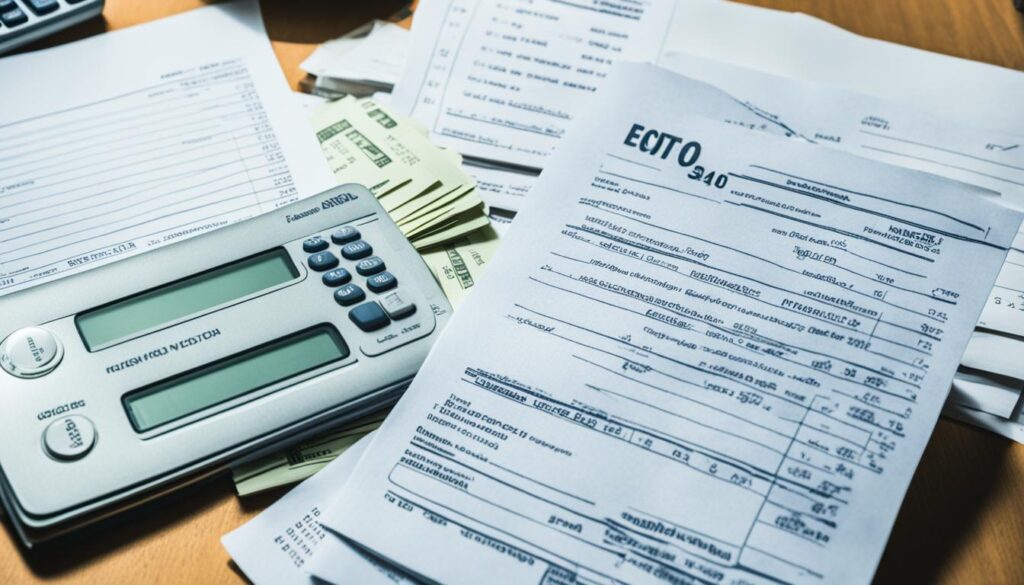Divorce can have a significant impact on your financial situation, including your credit scores. While the act of getting divorced does not directly affect your credit, the changes in your financial obligations and shared accounts can indirectly impact your credit scores. It’s crucial to understand how divorce can affect your credit and take proactive steps to rebuild and protect your credit after the divorce process. This article will provide best practices and effective strategies for credit repair after divorce, helping you take control of your financial future.
Key Takeaways
- Divorce can have indirect effects on your credit, including changes to shared accounts and joint responsibilities.
- Rebuilding your credit after divorce involves monitoring your credit reports, separating joint accounts, and establishing independent credit history.
- Updating your budget and managing your credit utilization rate are important steps in the credit repair process.
- Resolving joint debts with your ex-spouse and understanding the divorce decree’s impact on your credit obligations are crucial.
- Protecting your credit after a contentious divorce by freezing your credit and taking identity theft precautions is essential.
Does Divorce Directly Impact Your Credit Scores?
When going through a divorce, many individuals worry about the potential impact on their credit scores. While the divorce process itself does not directly lower your credit scores, the financial changes that occur during and after the divorce can indirectly affect your credit. The way you and your ex-spouse manage joint credit accounts, shared debts, and financial obligations can all have a significant impact on your individual credit scores.
Understanding the Indirect Effects of Divorce on Credit
One of the primary ways divorce can indirectly impact your credit is through the management of joint accounts and shared debts. If you and your former spouse shared credit card accounts or other joint debts, and your ex-spouse fails to make payments as agreed, your credit could suffer even though you are no longer together. Additionally, being removed as an authorized user on your ex’s credit card or closing shared accounts can impact your credit history and mix, which are both factors in your credit scores.
Shared Accounts and Joint Responsibilities
- Failure by your ex-spouse to make payments on joint credit accounts can negatively impact your credit scores.
- Being removed as an authorized user on your ex’s credit card or closing shared accounts can affect your credit history and mix.
- The divorce decree may not immediately absolve you of responsibility for joint debts, so it’s essential to work with your ex-spouse to ensure proper handling of these accounts.
While divorce does not directly lower your credit scores, the financial changes and shared responsibilities that come with the process can indirectly impact your creditworthiness. Understanding these indirect effects and taking proactive steps to manage joint accounts and debts can help you navigate the credit challenges during and after a divorce.
Rebuilding Your Credit After Divorce
If your credit has taken a hit due to the divorce process, don’t worry – there are steps you can take to rebuild your credit and establish a strong financial foundation for your future. The key is to be proactive and diligent in monitoring your credit reports and scores, as well as separating any joint accounts you shared with your ex-spouse.
Monitor Your Credit Reports and Scores
Regularly reviewing your credit reports and monitoring your credit scores is crucial for rebuilding credit after divorce. You can obtain free annual credit reports from the three major credit bureaus – Equifax, Experian, and TransUnion. Additionally, consider enrolling in a credit monitoring service to stay on top of any changes or potential issues with your credit health.
Separate Joint Accounts and Establish Individual Ownership
One of the most important steps in rebuilding your credit after divorce is to separate any joint accounts you shared with your ex-spouse and establish individual ownership of credit accounts. This will help you build your own independent credit history and credit score, without the potential negative impact of your former partner’s financial behavior.
By taking these proactive steps to monitor your credit reports and scores, as well as separating joint accounts and establishing individual credit, you can begin the process of rebuilding credit after divorce and setting yourself up for long-term financial success.

Building an Independent Credit History
After a divorce, establishing your own independent credit history is crucial for your financial well-being. If you were primarily an authorized user on your ex-spouse’s credit cards or didn’t have much of an individual credit history during the marriage, it’s time to start building your own credit profile.
One effective way to do this is by opening a new credit card in your name and becoming the primary account holder. Make sure to make all payments on time, as this will help you build a positive credit history. Additionally, a secured credit card, which requires a refundable security deposit, can be a great option if you have difficulty getting approved for a traditional credit card.
Another strategy for building credit history after divorce is to monitor your credit reports and scores regularly. This will allow you to identify any inaccuracies or discrepancies and take necessary steps to correct them. Remember, establishing independent credit post-divorce is crucial for your financial independence and security.
| Action | Benefit |
|---|---|
| Open a new credit card in your name | Builds your individual credit history |
| Consider a secured credit card | Helps establish credit if you have difficulty getting approved |
| Monitor your credit reports and scores | Allows you to identify and correct any inaccuracies |
“Building an independent credit history is essential for regaining financial control after a divorce.”
By following these steps, you can establish your own credit history and set yourself up for financial success in the post-divorce chapter of your life.
Updating Your Budget for the New Financial Situation
Divorce often brings significant changes to your financial situation, so it’s crucial to update your monthly budget to reflect your new circumstances. Budgeting after divorce and financial planning post-divorce are essential steps in managing finances as a single person.
Start by reviewing your income, expenses, and any shared debts or assets that need to be divided. Create a clear picture of your post-divorce financial obligations and allocate your resources accordingly. This may involve cutting back on certain expenses, finding ways to increase your income, or restructuring debt payments.
Developing a realistic budget will help you manage your finances more effectively and support your credit rebuilding efforts. Consider the following tips to update your budget for the new financial situation:
- Identify and separate shared expenses from individual expenses.
- Determine your new sources of income, such as alimony or child support.
- Prioritize essential expenses like housing, utilities, and food.
- Allocate funds for debt payments, savings, and discretionary spending.
- Review and adjust your budget regularly as your financial situation evolves.
By taking the time to create a comprehensive budget, you can gain better control over your finances and lay the foundation for a secure financial future post-divorce.
| Expense Category | Pre-Divorce | Post-Divorce |
|---|---|---|
| Housing | $2,000 | $1,500 |
| Utilities | $500 | $400 |
| Groceries | $800 | $600 |
| Transportation | $400 | $300 |
| Debt Payments | $1,000 | $800 |
| Discretionary | $500 | $300 |
The table above illustrates how a post-divorce budget may differ from the pre-divorce budget, highlighting the need for a thorough review and adjustment of your financial plan.

“Effective budgeting is the cornerstone of financial stability after divorce. It empowers you to take control of your finances and make strategic decisions for a brighter future.”
best practices for credit repair after divorce
After a divorce, one of the most crucial steps in repairing your credit is to make all of your payments on time, every month. Timely payments for credit repair post-divorce are essential, as payment history is the most significant factor in your credit scores. Ensuring you make at least the minimum required payments on any debts, bills, or credit accounts in your name is crucial for rebuilding your credit.
To stay on top of your obligations and avoid late payments, which can severely damage your credit, consider setting up automatic payments or payment reminders. This will help you maintain the importance of on-time payments for credit and demonstrate to lenders that you are a responsible borrower, ready to take control of your financial future.
- Set up automatic payments or payment reminders to ensure you never miss a due date.
- Make at least the minimum required payments on all debts and bills in your name.
- Prioritize timely payments to rebuild your credit after the divorce.
“Consistent, on-time payments are the foundation of a strong credit profile. By making this a top priority, you’re taking a crucial step towards financial recovery after divorce.”
Remember, payment history is the most significant factor in your credit scores, so making timely payments for credit repair post-divorce is essential for rebuilding your credit and securing your financial future. With discipline and commitment, you can regain control and establish a solid credit standing.

Managing Your Credit Utilization Rate
As you navigate the financial landscape after a divorce, understanding and managing your credit utilization rate is crucial. Your credit utilization rate, which represents the amount of credit you’re using compared to your total available credit, is a significant factor that can impact your credit scores.
To maintain a healthy credit profile, it’s recommended to keep your credit utilization below 30% of your total available credit. High utilization rates can negatively affect your scores, making it more challenging to secure loans, credit cards, or even favorable interest rates. As you work to rebuild your credit after divorce, be mindful of your credit utilization and consider strategies like balance transfers or debt consolidation to help lower your overall credit utilization.
The Importance of Credit Utilization for Your Scores
Your credit utilization rate is one of the key factors that credit scoring models take into account when determining your creditworthiness. It’s a direct indicator of the amount of credit you’re using compared to the total credit available to you. Maintaining a low credit utilization rate demonstrates to lenders that you’re a responsible borrower, which can positively impact your credit scores.
- Credit utilization accounts for 30% of your FICO® Score, making it the second-most important factor after payment history.
- Lenders view high credit utilization as a sign of financial stress, which can make you appear riskier to work with.
- Lowering your credit utilization can help rebuild your credit scores after a divorce, particularly if you had shared accounts or joint responsibilities that negatively impacted your credit.
Strategies for Managing Credit Utilization After Divorce
As you work to manage your credit utilization after a divorce, consider the following strategies:
- Monitor Your Credit Reports and Utilization Rates: Regularly review your credit reports and monitor your credit utilization to ensure it remains low. This will help you identify any issues or changes that may need attention.
- Increase Your Total Available Credit: Apply for additional credit cards or loans to increase your total available credit, which can lower your overall credit utilization rate without increasing the amount of credit you’re using.
- Utilize Balance Transfers: Consider transferring balances from high-interest credit cards to a new card with a lower interest rate or a 0% introductory APR. This can help you pay down debt more effectively and reduce your credit utilization.
- Consolidate Debts: Explore debt consolidation options, such as a personal loan, to combine multiple debts into a single, more manageable payment. This can also help lower your credit utilization.
By focusing on managing your credit utilization rate after a divorce, you can take a significant step towards rebuilding your credit and financial stability. Remember, maintaining a low credit utilization is not only important for your credit scores but can also help you secure more favorable terms when applying for loans, credit cards, or other financial products.

Resolving Joint Debts with Your Ex-Spouse
Dividing joint debts and accounts during a divorce can be a complex and challenging process, but understanding your responsibilities is crucial for rebuilding your credit. While your divorce decree may outline who is responsible for which debts, it’s important to note that this agreement does not absolve you of legal responsibility for those accounts.
If your former partner fails to make payments as agreed, it can still negatively impact your credit score. To protect your financial future, it’s essential to work closely with your ex-spouse and your divorce attorney to ensure joint debts are properly separated and that you are no longer legally responsible for accounts you did not retain.
Understanding the Divorce Decree and Debt Obligations
The divorce decree is a legally binding document that outlines the terms of your divorce, including the division of assets and liabilities. While this decree may specify which party is responsible for which debts, it’s crucial to understand that this agreement does not automatically remove you from legal liability for those accounts.
- Even if the decree states your ex-spouse is responsible for a joint debt, you may still be liable if they fail to make payments.
- It’s important to work with your attorney to ensure joint debts are properly separated and that you are no longer legally responsible for accounts you did not retain.
- Failure to resolve joint debts can continue to impact your credit score and financial future, even after the divorce is finalized.
By understanding the intricacies of resolving joint debts after divorce and your debt responsibilities outlined in the divorce decree, you can take proactive steps to protect your credit and start rebuilding your financial independence.
Filing Taxes After Divorce
Navigating the tax landscape after a divorce can be a complex and daunting task. As you transition into your new financial situation, it’s crucial to understand the tax implications of your divorce and how to file taxes effectively. From deciding on your filing status to managing shared assets or liabilities, the decisions you make can have a significant impact on your overall financial well-being and credit standing.
One of the first steps in filing taxes after a divorce is to communicate openly with your ex-spouse. This can help ensure that you both understand your respective tax obligations and work together to maximize any potential benefits, such as filing a joint tax return if it’s financially advantageous. Mishandling tax-related matters can lead to unintended consequences, so it’s essential to consult with a tax professional who can guide you through the process and ensure you’re meeting all your tax obligations as a newly divorced individual.
- Understand your filing status options and how they may impact your tax liability.
- Determine who will claim any dependents and the associated tax credits.
- Manage the division of shared assets and liabilities and their tax implications.
- Explore any potential tax deductions or credits that may be available to you post-divorce.
By staying informed and working closely with your ex-spouse and a tax professional, you can navigate the tax implications of divorce and ensure a smooth transition into your new financial reality.
“Divorce is one of the most financially complicated life events a person can go through. Careful planning and attention to detail are essential to avoid costly mistakes.”
Protecting Your Credit After a Contentious Divorce
If your divorce was particularly contentious or you’re concerned about your ex-spouse potentially opening new credit accounts in your name, it’s crucial to take proactive steps to protect your credit and identity. One powerful option is to place a credit freeze on your credit reports, which restricts access to your credit information and makes it much harder for someone to open new accounts in your name.
Freezing Your Credit and Identity Theft Precautions
Alternatively, you can consider enrolling in an identity theft protection service that can monitor your credit, alert you to suspicious activity, and provide valuable assistance if you become a victim of identity theft. These services can give you peace of mind and help you safeguard your financial future in the aftermath of a contentious divorce.
By taking these proactive measures, you can take control of your credit and protect yourself from potential abuse or exploitation by your ex-spouse. It’s a crucial step in the journey of rebuilding your financial independence and security after a challenging separation.
FAQ
Does divorce directly impact my credit scores?
How can divorce indirectly affect my credit?
What steps can I take to rebuild my credit after divorce?
How do I build an independent credit history after divorce?
How should I manage joint debts with my ex-spouse after divorce?
What should I consider when filing taxes after divorce?
How can I protect my credit after a contentious divorce?
Source Links
- How To Rebuild Credit After Divorce | Equifax – https://www.equifax.com/personal/education/life-stages/articles/-/learn/how-to-rebuild-credit-after-divorce/
- Divorce and Credit Repair: What You Need to Know | Credit.com – https://www.credit.com/blog/divorce-survival-guide/
- Did your credit score take a hit after you got a divorce? Here’s how you can rebuild it – https://www.cnbc.com/select/rebuild-credit-score-after-divorce/

